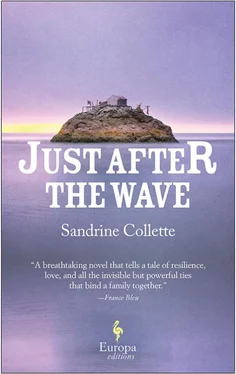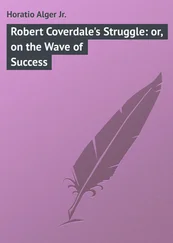“It’ll do. Scram.”
Once the little boy has left, he gets up to turn the key in the lock, then hesitates. Should he lock the kids up? But where would they go, and who could they warn; he gives a shrug and lies down.
As always, he starts counting to fall asleep. Usually by the time he reaches five, sometimes six, he’s out. Eight if something is really bothering him.
Three, four. That will do for today.
* * *
But when he wakes up, Ades isn’t pleased, not one bit. For a start, those damn kids made noise this morning, playing, or shouting, or something, while he was still contentedly sleeping between two dreams, until a plate smashed and he sat up with a start. And then nothing was ready. With his hair disheveled, looking like a bad-tempered giant, he walked over to the stove and looked at the little girl.
“Where’s the coffee?”
She pointed to a box.
“No,” he growled, shaking his head, “hot coffee, shit. Make me a mug.”
And he took advantage of the silence caused by his sudden appearance to say, very loudly:
“In fact, next person wakes me up in the morning will get a hiding they’ll remember until the day they die. And if that’s a problem, death can come real soon. Is that clear?”
No answer. Three pairs of eyes staring at him like frightened mice. Yes, kids, Ades is here now, make it snappy and I won’t ask twice. I want my coffee in my cup soon as I get up, and same thing for meals, the minute I snap my fingers.
And I want a map so I can find my way.
Until Noah says in a tiny little voice:
“There’s no more map. Pata took them all for their trip.”
Crap.
“Are you going to leave?”
Ades isn’t listening.
“Will you take us with you?”
This time he looks at the boy, and he hadn’t planned it, but it just takes hold of him, he bursts out laughing, a huge, monstrous laugh, he tries to repress it but can’t, he was right to think the little brother was a dimwit—as if he would take them. And what else? They can just stay on their island.
“We’ll die if we stay here. This morning the water is up to step number ten.”
Ades doesn’t know what he means and doesn’t care. Kids die every day of the week. The only thing on his mind is which way to go and how many days it will take to reach land.
“I need supplies.”
“We don’t have much.”
I’ll take it all. But he doesn’t say it. He opens the cupboards to make his own inventory. Goddammit, they’re right. A dozen eggs, a few pancakes. He looks at Perrine.
“You know how to make pancakes?”
She nods.
“Then get going, use all the flour that’s left.”
“But… then there’ll be nothing left for us?”
He doesn’t answer.
“And the chickens, we’ll kill those chickens and cook them.”
Louie looks up all of a sudden.
“I know where there are loads of potatoes. But you need a boat to get there.”
Ades stands still.
“Potatoes?”
“A whole field of ’em. Since we don’t have a boat anymore, we couldn’t go get any. There’s enough there to eat for weeks.”
Ades thinks. He figures he should leave the island two days from now. That way he should avoid running into the father—and by then the water will cover the land all the way to the second floor of the house, leaving only a few feet of land at the top of the hill. Two days should be more than enough to dig up some spuds and get the little girl to cook them all. If he leaves with forty pounds of cooked potatoes, he’ll make it. So he looks at Louie, who is waiting.
“All right. You show me and we’ll see when we get there. If they’re good, we’ll start digging them up.”
Perrine and Noah move closer, worried.
“What about us?”
“You stay here.”
On his way out Ades adds with an icy guffaw:
“You have to keep watch on the island. You never know, there might be burglars!”
He doesn’t see their terrified expressions, and even if he did, he wouldn’t give a damn.
But he doesn’t see the little black and yellow clouds forming on the horizon, either, or notice that the wind has gotten up, and is bringing those clouds toward them, inexorably.
As he steps foot on the potato island for the first time in days Louie feels a sort of exaltation. And yet the land here, too, has shrunk, eaten away by the water lapping all around the island, but at the moment it doesn’t matter, all Louie can think of is showing Ades the patch of potato plants, with a scarcely concealed pride, as if this were his domain, as he comments— They’re not quite ripe but they’re fine for sweet little new potatoes, they’re really good, and you can eat the skin— and he fingers the leaves that are beginning to go yellow, and takes the spade from the shed to dig up a plant— you see, I told you so. They’re good potatoes all the same. Ades is trying to work it out. But he’s never had a potato patch.
“How many pounds are there?”
“Where?”
“All together.”
“If we harvest them all?”
“Yeah.”
“Well… I don’t really know, it depends on whether all the plants are good or not. Four hundred pounds, maybe?” He chooses the figure quite at random, because Ades seems to be hoping for a considerable amount, and four hundred pounds is huge; he’s rather pleased with himself, four hundred pounds is pretty good.
Ades snorts with laughter. No way.
“Sure there are.”
“Then these two rows here will be enough. Go on, start digging.”
“Me?”
Louie is about to say that it will go faster if Ades does it himself, with his strength and endurance, then he sees the way the man is looking at him, the gleam concealed in his vague smile, narrow, chilling, and he swallows his words. Ever since Ades got there, he has sensed something strange—a diffuse, disquieting feeling, not unlike the way the hens react when Ades walks by them, something instinctive: he knows the man is no good.
And he knows that the man has a boat. Even if there’s no more fuel, the boat has oars, the means to go forward. He thought about it all night long, was tempted to wake Perrine and Noah before dawn to escape in the little craft, just like his parents did ten days ago, and this time it would be Ades who got left behind, it would be their turn to sail away as fast as they could, to get back to high ground. But he didn’t do it. He remembered all of a sudden what Pata had said: the journey would take nearly two weeks.
Two weeks of supplies on the boat. That’s what Ades is planning now—for himself alone. The children can’t leave without taking something. And they can’t start stockpiling food without Ades noticing.
Ades who won’t take them with him, ever. He has no intention of doing so, doesn’t even think about it. It’s not even on purpose: he just doesn’t care, that’s all. Louie is sure of this, Ades will let them drown, let them die, beyond a shadow of a doubt. He, Louie, doesn’t have much time, very little time, to come up with a plan. The potatoes were one way of gaining a day. But he has been pressing on the spade, bringing up earth and potatoes for nearly an hour, and he can’t think of anything.
He stands up straight, carefully, his back aching, and wipes his forehead. An instinctive glance, because the sky has imperceptibly changed color. Yes, that is the only thing he can think of: a storm, or at least a good squall. So Louie drops everything, the spade and the potatoes scattered around, and he runs to stand in front of Ades who is smoking a cigarette of dark tobacco, We gotta go.
“But you haven’t finished.”
Читать дальше












